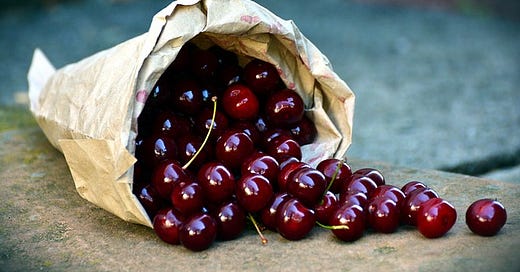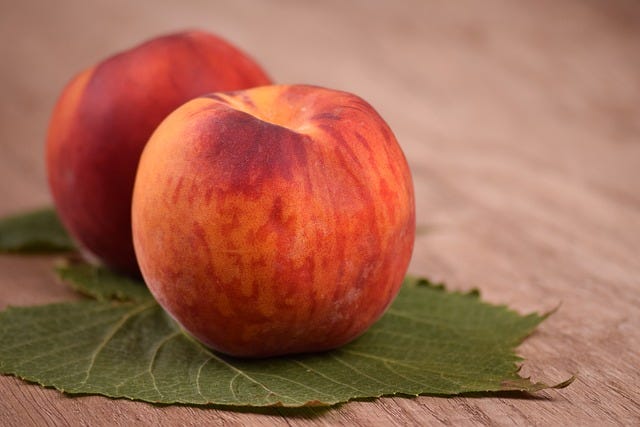Summer Fruits
by Margaret E. Sangster
When scarlet strawberries first were seen
A blush their clustering leaves between,
I thought that never fruit could be
Delicious as the strawberry.
When cherries ripened firm and fine,
The blackbirds shared their feast with mine,
And Summer's sunshine seemed to glow
On satin skin and heart of snow.
When threaded close on slender stems
The currants gleamed like priceless gems;
When peaches held the velvet cheek
The south wind's coy caress to seek;
The loveliest which I could not choose,
Unwilling one fair gift to lose,
Where frost and fire, and old and new,
And night and day, and dusk and dew,
Had blent to tinge the living sap
And shape the cup for Nature's lap.
Now near and far the apple's wealth
Is servitor of joy and health,
And all along the vineyard's line
The purple grapes are sweet as wine,
For He who pledges daily bread,
With bounty hath our table spread.
And as the singing winds go by,
The drifting odors make reply;
And brook and forest, mount and flood,
Chant "Praise the Lord, for He is good."
The poem "Summer Fruits" by Margaret E. Sangster celebrates the beauty and bounty of summer fruits. It begins with the sight of strawberries, whose first appearance between their leaves brings delight and admiration. The poet feels that no fruit could be as delicious as the strawberry.
The poet enjoys their firm and fine texture as cherries ripen, sharing this feast with blackbirds. The cherries' appearance, with their glossy skin and white hearts, reflects the warmth of summer sunshine.
Currants, resembling precious gems strung on slender stems, and peaches, with their soft, velvety skin seeking the caress of the south wind, add to the variety and beauty of summer fruits. The poet finds it difficult to choose a favorite among these lovely offerings, each contributing uniquely to nature's bounty. The fruits embody the blending of different elements like frost and fire, day and night, which enhance their life and form.
The poem moves to abundant and healthy apples and grapes along the vineyard line, sweet as wine. The poet recognizes the divine provision of these fruits, attributing them to the Creator, who ensures daily sustenance with generosity.
As the winds carry these fruits' fragrances, nature responds in a chorus of praise, with brooks, forests, mountains, and floods joining in the chant, "Praise the Lord, for He is good." The poem is a hymn of gratitude for nature's gifts and the divine care that provides them.
And then there is the great song from “Porgy and Bess,” “Summertime,” by composer George Gershwin and singers Ellan Fitzgerald and Louis Armstrong:






